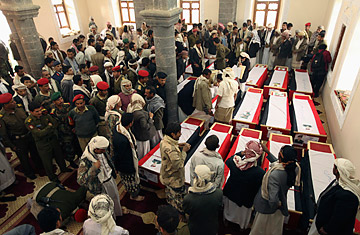
Families of the victims attend a funeral ceremony for Republican Guards killed in a suicide car bomb attack in southern Yemen, at a mosque in Sanaa, Feb. 27, 2012. Al-Qaeda claimed responsibility for the attack that killed at least 26 people outside a presidential palace in southern Yemen on Feb. 25, 2012, hours after Abd-Rabbu Mansour Hadi was sworn in as President.
(2 of 2)
"They scaled the walls of the base by nightfall," Ali Saleh Kardah, a colonel from the 115th infantry brigade, a military unit stationed near the beseiged base, told TIME. "They shot soldiers in cold blood while they were sleeping in their tents... 40-50 soldiers from my brigade were killed and we still have dozens missing."
"We've found bodies dumped in the desert with heads, hands and feet missing," said the colonel his voicing faltering as he spoke over the telephone. "We need more support, observatory planes, they can support us with more weaponry, they can." Medics from Ba Suhaib, a nearby hospital, said they had started storing some of the bodies in the freezers of local restaurants after they ran out of space in the hospital morgue.
As the government's elite counterterrorism forces armed and trained by the U.S. battled opposition tribesmen in the capital last year, jihadist groups found greater license to operate in the south. A group calling itself Ansar al-Sharia, the Partisans of Islamic Law, closely aligned to Al-Qaeda, have capitalized on the erosion of the central government's authority by embedding themselves in towns and cities in the rugged province of Abyan, exploiting rampant poverty and broad discontent to garner the support of local people.
"Most of the militants are local people, some even live with their families. It's not always clear who is who. These people can't be defeated with bombs and bullets, they're fighting for hearts and minds, and in this context that's what counts," said Saeed Al-Fahdi, one of a handful of Yemeni journalists, who travelled recently to Zinjibar, an Ansar al-Sharia stronghold. "The local people there do not trust either side but it is al-Qaeda who are drilling wells while the government bomb their homes."
Many Yemenis, though, remain baffled at how a group believed by experts to number no more than a few hundred diehard fighters was capable of inflicting such grievous damage. "It's simple: The soldiers in Abyan have been on the front lines for months, zero morale, zero interest," said a senior Yemeni official who did not wish to be named. "We don't have a professional army." Others suspect more sinister forces may be at play, pointing out conspiratorially that Sunday's bloodshed coincided with the sacking by the new president of General Mahdi Maqwala, a close friend of Saleh and former commander of government forces in the south Yemen.
Saleh, meanwhile, has vacated the presidential palace, but still heads the powerful GPC ruling party and has his relatives scattered throughout the upper echelons of the military and security apparatus. His opponents, who for years accused him of manipulating the threat of terrorism to scare Washington and Riyadh into backing him, believe he and his supporters will want to prove a point."The West in particular will be drawing comparisons between Saleh and Hadi. Right now the growing strength of al-Qaeda only serves to make Saleh appear stronger," said Abdullah Al-Faqih, a professor of politics at Sana'a university.
As President Hadi knuckles down to addressing the vast challenges that confront his rule, many Yemenis are questioning the thinking that underlies the campaign against jihadism. "Blood begets blood," said Hamoud Al-Hitar, a prominent Yemeni judge enlisted by the government to lead a Yemeni jihadist rehabilitation program. "Using force only strengthens the logic and rationale of al-Qaeda. If drone strikes were a successful means for eliminating al-Qaeda, would the Americans still be having problems now in Afghanistan and Pakistan? Right now there is no dialogue with them whatsoever, no logic, no discussion, no meetings, no nothing. Hadi is acting under pressure from the West, he is using force without logic... He is leading us down a very dangerous road."
